How we Fight for the Future in 2025
This year’s United States election was a catastrophe for all who care about human rights. We are dismayed, furious, grieving—but we’re not afraid. While the path may have shifted, we still know where we’re going, and we’ll be louder and more audacious than ever in our fight to ensure that technology is a force for liberation and empowerment rather than exploitation and authoritarian power. We’ll strategically play defense against federal and corporate efforts to censor the Internet, criminalize speech, block access to knowledge, or weaponize the U.S. surveillance apparatus against marginalized folks, while strengthening our partnerships with grassroots social movements to win bold tech justice victories at the state and local levels.
Our team is composed of activists and technologists with decades of experience. So you can bet that although news cycles will rage and platforms will grow and die, Fight for the Future will be fighting for the right stuff: for privacy and sanctuary for abortion-seekers, immigrants, and LGBTQ+ folks; against the censorship of information, communities, and art; for the ability of activists to experiment with distributed networks and build a new, better internet.
Below, we describe some of our biggest wins from 2024. As you read on, we hope you recognize a campaign you have contributed to—because it’s you who makes this work possible. If you’d like to support these fights financially, click here.
Billionaire-backed politicians on both sides of the aisle want us passive, hopeless, and divided. We vehemently object. In 2025, we’ll fight the bad stuff and preserve technology that’s joyful, collaborative, protective, and alive. Do it with us.
This Year We Will
Under Trump, we expect the United States’ enormous surveillance apparatus will be leveled against immigrants, abortion-seekers, journalists, and political dissidents on a dangerous new scale. We have a plan to fight back—a movement for surveillance-free sanctuary cities which reject surveillance technology, federal spying, and the mass collection and circulation of personal data.
We’ll also raise the political cost for public places that are considering or seek to install technology like facial recognition and automated license plate readers, and we will ruthlessly target any company that facilitates mass surveillance. Unless concrete changes are made to data collection and retention practices, companies from Alphabet to Zoom should brace for a world of hurt from the human rights community—led by us.
On the campaign trail, Trump vowed to throw out President Biden’s Executive Order on AI, which attempted to fight automated discrimination and protect privacy. Under Trump, we expect that automated decision-making tools will balloon in areas like housing, healthcare, and education, where they’ll discriminate without accountability or redress. To prevent the worst, we’ll have to get creative.
Our plan here is to develop toolkits and narratives that empower lawmakers to stand up to the increasingly powerful AI lobby. We’ll share our tech tools and resources with groups working against harmful uses of AI in areas like healthcare, housing, education, employment, and law enforcement. We’ll also continue to push back against bills that grant dangerous new power to Big Media at the expense of creators, like the NO FAKES and the No AI FRAUD Acts, and we’ll advocate for legislation and corporate accountability that puts everyday people first. Further, we’ll continue to champion open source as an important alternative to AI controlled by Big Tech, including the creation of more transparent and accountable public datasets for AI training.
Last year, we strengthened the intersectional movement against the Kids Online Safety Act (KOSA), a censorship bill disguised as children’s safety legislation. Because KOSA enables the political censorship of digital content, it is supported by radical conservative groups like the Heritage Foundation, who have said they’d use it to wipe LGBTQ+ content from the net. Although we’ve successfully stalled KOSA multiple times, it remains a threat.. We’ll do everything in our power to make KOSA unpopular—and unpassable.
Beyond KOSA, we expect the Trump administration and allied state leaders will attempt to censor everything from climate science to abortion and health information. The tech justice movement cannot yield any ground here, because information access literally saves lives. In 2025, we will expand our anti-censorship coalition, orchestrate mass mobilizations around online free speech, and cement information access as a key progressive value.
Big Tech leaders and venture capitalists are no longer feigning neutrality: they were key allies in Donald Trump’s return to the White House. Tech billionaires’ unchecked political and economic power is one reason we’ve always supported structural harm reduction policies like antitrust regulation and privacy laws.
We expect, of course, that any antitrust action will only be used to further the financial interests of Trump’s cronies. So, we will focus on supporting alternative digital infrastructures by defending encryption, the right to code, and privacy-preserving digital tools. We’ll expose and fight financial surveillance by the Trump administration, sympathetic agencies and corporations alike, particularly surveillance that targets protestors, undocumented people, and people seeking abortions or gender-affirming care. And, we will continue to stand up for open source, community -owned and -governed alternatives to centralized Big Tech models for storage, finance, and communication.
We are witnessing a disturbing trend: tech thinkers and Democratic politicians are throwing vulnerable people under the bus in the name of empty ideals like “bipartisanism.” On this, we are crystal clear: any movement for justice, including tech justice, must unequivocally reject the normalization of anti-LGBTQ+, anti-immigrant, anti-Palestinian, and anti-feminist rhetoric.
In the coming year, we’re excited to grow our partnerships with LGBTQ+ organizations, abortion access groups, and organizations led by youth, low-income people, people of color, and disabled people. We will expand our collective capacity, build cross-movement campaigns, and power rapid response actions to ensure that tech regulation does not come at the expense of the vulnerable. And we will call out the tech policy community when it platforms racists and bigots. As Fight for the Future Director Evan Greer demanded last month at an event by a prominent digital rights group, “Are we building an Internet with free speech and safety for all people? Or just the privileged few?”
2024 Victories
In 2024 we…

Fought off Congressional efforts to censor speech in the name of kids’ safety
We need data privacy legislation, not censorship, and our campaign to stop KOSA—a censorship bill disguised as a child safety bill—continued to build momentum this year. In total, our campaign has sent nearly 400,000 messages to Congress opposing KOSA and similar bills, and we continue to highlight the perspectives of LGBTQ+ youth whose access to critical online resources and communities would be threatened if KOSA passed. We consistently called out corporate pinkwashing and Democrats’ misguided support for the bill, rolled out a billboard truck during a KOSA markup, and organized anti-KOSA actions at Pride events across the country. Our efforts were covered in a number of prominent press outlets, including on Vegas PBS, ACLU’s At Liberty podcast, and NPR’s On Point with Meghna Chakrabarti. We published widely-read op-eds in VICE and them, and were quoted extensively in outlets including NBC , The Washington Post, and The New York Times.
Demanded real privacy protections, not xenophobia
When lawmakers tried to ban TikTok yet again, we helped young people and TikTok creators channel outrage into action through DontBanTikTok.com. We called it like it is: the rhetoric fueling a TikTok ban is a xenophobic moral panic that disregards the 150 million users in the US who use the app for news, small business, community organizing, and self-expression. While we should all be concerned about how apps like TikTok collect and abuse our personal data, US based apps collect the same intimate data about us too, and any government can simply go out and buy our data from a data broker. To really stop the abuse, we advocate for strong privacy laws and antitrust action to break up the companies getting rich off their data empires and have launched campaigns to ban data brokers, and get a national opt-out registry that can restore personal privacy to millions.
Put a nail in the coffin of Amazon’s police partnerships
For years, we’ve been working with our coalition partners to end Amazon’s surveillance empire and dismantle Amazon Ring’s partnerships with the police. This year our pressure campaign paid off when, in January, Amazon announced it would shutter its “Request for Assistance” (RFA) tool, the feature that allowed cops to demand doorbell camera footage from users through the Neighbors app. The announcement came quietly, but its impact is massive. The RFA tool had given “police departments an Easy Button for vacuuming up Ring footage without a warrant” and enabled the unchecked collection of private video footage. Eliminating the RFA tool means a major pipeline for warrantless police access to citizens’ Ring cameras is gone. This is a truly impressive victory for the many groups that have been building opposition to Amazon’s surveillance.
Supported student activists and protestors fighting genocide
This year’s brutal repression of Palestinians and student protestors demonstrated the importance of uniting the tech justice movement against genocide and militarized policing. To assist organizers on the ground, we built and provided surveillance-free custom call tools enabling protesters to drive calls directly to their university administrations. We also launched a significant new campaign opposing mask bans—laws that would penalize wearing face masks in a brazen attempt at limiting free expression and criminalizing protest. Our campaign, developed in close collaboration with disability rights groups and privacy experts, underscores the ways in which these bans expand surveillance and threaten public health. At the 11th hour, we worked to flip 34 Democratic votes on “nonprofit killer” legislation aimed to punish student protesters.
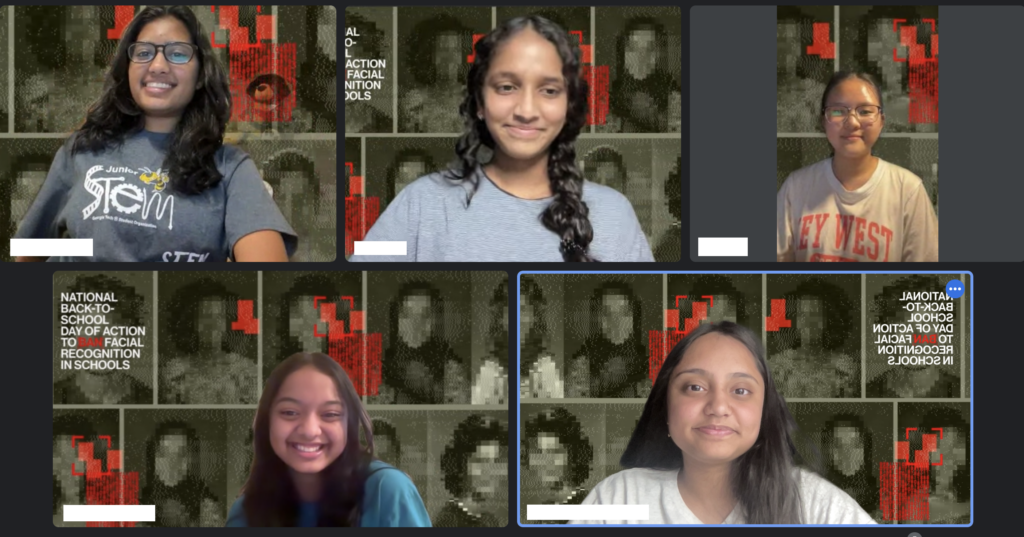
Demanded a nationwide ban on facial recognition in schools
K-12 schools have become a major target for facial recognition companies, marketing their surveillance tech with false promises to keep kids safe. We fought back, building on our call for an all-out ban on facial recognition tech in a coordinated campaign with Encode Justice to demand the Department of Education to advise schools against using this surveillance technology as a part of its responsibilities under the Executive Order on AI. We organized meetings between parents, students and the Department of Education, and hosted a series of live actions and webinars in California, D.C., Georgia, and New York. During actions, dozens of student organizers and privacy advocates contacted policymakers, raised awareness amongst students and community members, and delivered 12,000 petition signatures to the Department of Education. Whether it’s creepily watching students in class, tracking attendance, or monitoring hallways—or e-proctoring technology that analyzes students’ faces as they take tests online—facial recognition is invasive, biased, and puts people’s most sensitive data at risk of being abused or stolen. Facial recognition simply does not belong anywhere near our nation’s students.
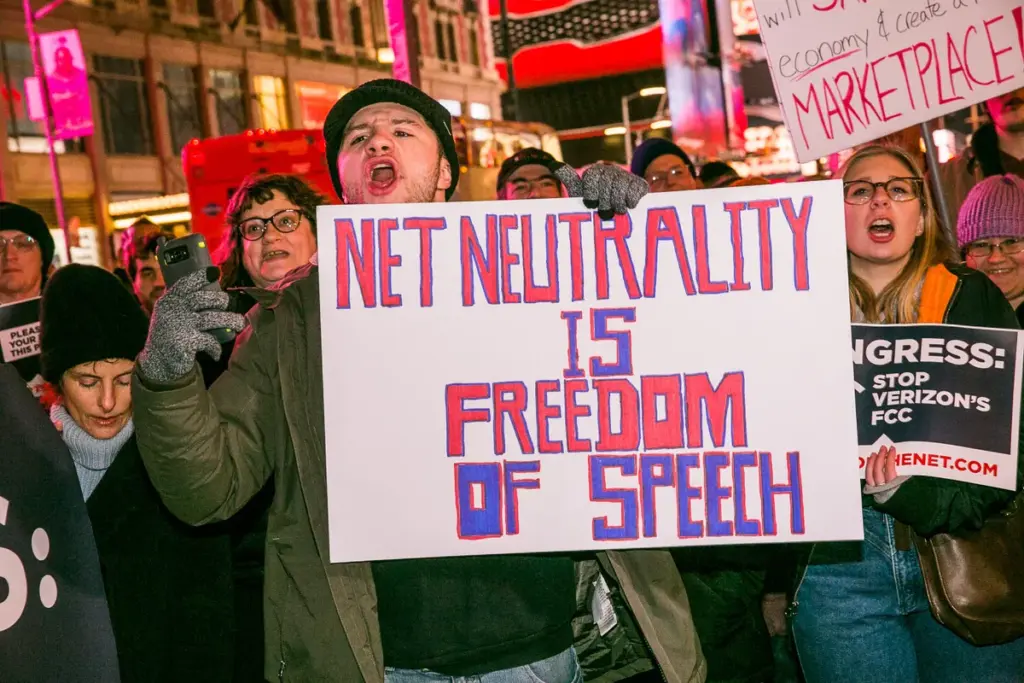
Won back net neutrality!
As the FCC rulemaking process kicked off, we fired up our Battle for the Net campaign to reinstate net neutrality, a key tool for reigning in Big Tech and putting telecom access and decision making in the hands of all communities. Our successful efforts included building a coalition of 140 organizational signers; co-leading an open letter penned by over 275+ influential artists and musicians, including Tom Morello, Amanda Palmer, and Cory Doctorow that emphasized the importance of strong Title II net neutrality protections for creative livelihoods; and mobilizing a wide range of supporters, from individuals and businesses to veterans and first responders, generating tens of thousands of comments to the FCC to make sure the reinstatement came with robust rules against blocking, throttling, paid prioritization, and fast lanes.
Drove 3,000 comments calling for a ban on AI tools in policing
AI tools such as facial recognition, automated license plate readers (ALPRs), gunshot detection, and predictive policing software are growing ever more prevalent in law enforcement—yet they infringe on privacy, civil rights and liberties, and supercharge biased police practices. These tools do not offer communities safety or justice. In fact, they represent mechanisms of oppression and surveillance. No amount of regulation, transparency, or oversight can resolve the dangers inherent in their widespread use. When the Department of Justice sought public comments, we drove thousands of responses their way demanding a ban on AI-based tools for law enforcement.
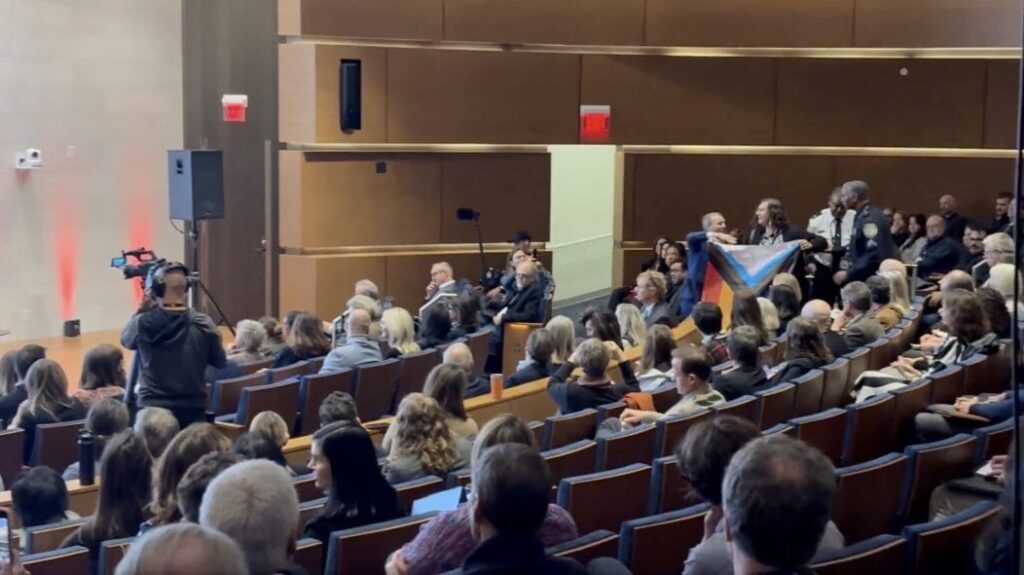
Stood up against anti-trans bigotry
At a “Summit for the Future of the Internet”, Fight director Evan Greer spoke out forcefully against Rep. Nancy Mace’s (R- SC) violent transphobic campaign and her presence at the tech event. Evan stood up and unfurled a progress pride flag, saying: “We’ve had dozens of trans people die this year because of the lies you’re spreading. Is this the future of the Internet we want? Are we building an Internet with free speech and safety for all people? Or just the privileged few?” Evan’s confrontation, covered widely in the press, is part of Fight’s resistance to normalizing the inclusion of bigoted rhetoric in tech spaces, and responding as a movement to the ongoing assault against bodily autonomy and queer and trans rights. Over the last year Fight has successfully built out a robust network of LGBTQ+ and other aligned bodily autonomy groups to more effectively engage at the intersection of tech justice and LGBTQ+ safety and strengthen cross-movement campaigns. We have connected with over 300 organizations and significantly increased our support of frontline groups to ensure that tech policies do not jeopardize queer and trans youth or the bodily autonomy of millions.
Pushed for a national opt-out registry to restore privacy for millions
Data broker giants, like Acxiom and RELX, companies you have likely never heard of, have a staggering reach into the most private corners of our lives. They collect and sell detailed information on over two-thirds of US residents, tracking our daily movements, relationships, purchases, and activities. The sale of this personal data fuels mass surveillance, and puts vulnerable communities—including domestic violence survivors, abortion seekers, and social justice advocates—at grave risk. It also exposes people to hacking, doxxing, and AI scams, as well as discrimination in housing, employment, banking and more. To fight this insidious threat to personal privacy, we built a coalition of 30+ organizations to demand action. We called for data brokers to be shut down and petitioned the FTC to address the abuse head-on by creating a national opt-out registry—a transformative tool to curb exploitative data collection and put privacy back in the hands of individuals. By emphasizing the life-saving impact of removing financial barriers to privacy, we gained traction with the FTC and helped advance critical discussions on the bipartisan DELETE Act.
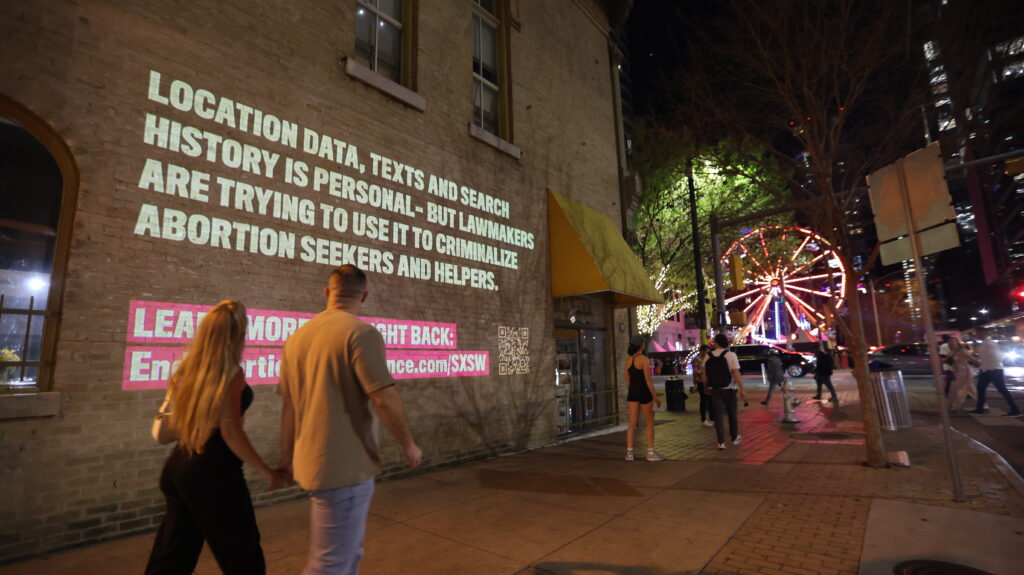
Created a flash point around abortion surveillance at SXSW
State abortion bans are forcing one in five patients to travel out of their home state to access care, and many states are trying to pass, or have already passed, abortion travel bans. Along with partners at Plan C, we organized a major presence at South by Southwest in Austin, Texas, including mobile billboards and projections placed strategically throughout the city to call out the ways that Google, Uber, Lyft and other tech companies sponsoring the event are complicit in abortion surveillance and the criminalization of abortion travel.
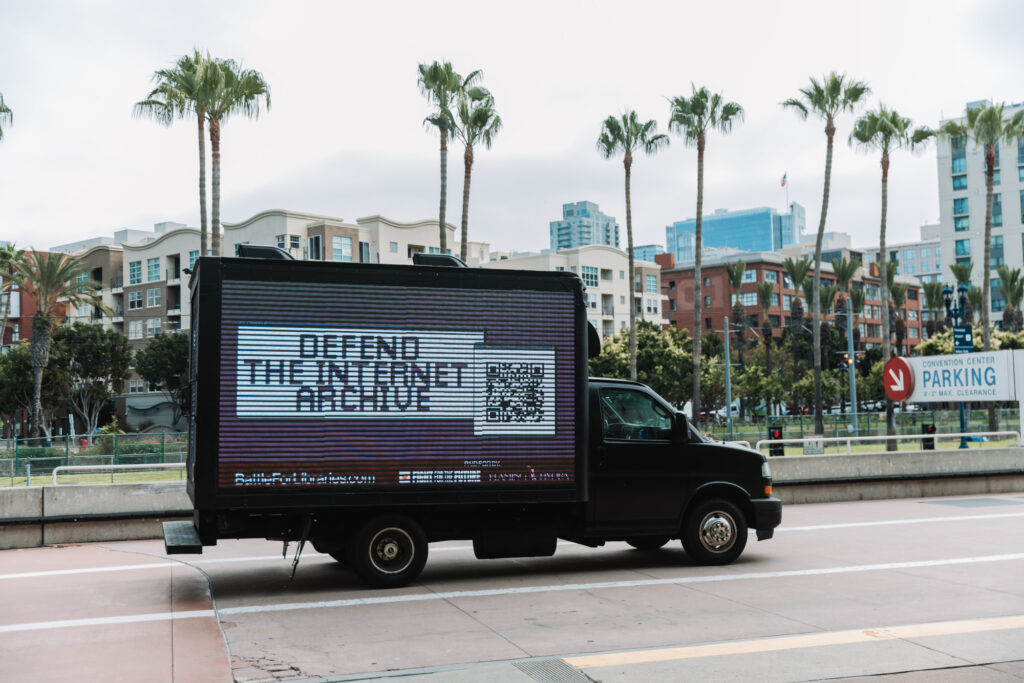
Rallied support for the Internet Archive’s battle against Big Content and reader surveillance
In defense of the nonprofit Internet Archive, we rallied hundreds of musicians to speak out and call for major labels to drop their existential lawsuit that would destroy the Archive. At the American Library Association Conference and outside of Big Publishing’s New York headquarters, we organized with author collective Flaming Hydra to put publishers on blast for their betrayal of libraries and diverse readerships with invasive ebook surveillance. And, we mainstreamed the fight against censorship and erasure in publishing by organizing a broad coalition of 25+ groups from GLAAD to Color of Change to demand a congressional investigation into big publishing’s stranglehold on digital books.
Campaigns by the Numbers
Our most successful campaigns and victories are only possible because we’re able to engage millions of people and get folks to take action. Here are some stats from our 2024 campaigns.
- 38 Campaign pages launched in 2024
- 22,223 Calls in 2024
- 157,569 Petition signatures in 2024
Top Press
Press coverage of our campaigns is a key tactic for reaching more people and putting pressure on critical targets. This year we were featured in dozens of outlets, with hundreds of press hits. Here are some of the top articles:
- How the Kids Online Safety Act Was Dragged Into a Political War
The New York Times
July 30, 2024 - The chaos surrounding a possible TikTok ban, explained
MSNBC
March 9, 2024 - Ring will stop giving cops a pass on warrantless video requests
Wired
January 24, 2024 - Boston musician and activist spars with Representative Nancy Mace over transgender rights at tech event
Boston Globe
November 22, 2024 - Facial recognition technology use at stadiums across the U.S. sparks protests
NBC News
August 21, 2024 - Abortion Rights Activists Get Creative to Challenge Big Tech at SXSW: ‘No Business as Usual’
Jezebel
March 4, 2024 - Senators studied AI for a year. Critics call the result ‘pathetic.’
Washington Post
May 15, 2024 - This Bill Purports to Protect Kids from Big Tech. For LGBTQ+ Youth, It’s a Grave Danger
them
July 12, 2024 - Net neutrality is back: FCC bars broadband providers from meddling with internet speed
CBS News
April 25, 2024 - AI Deepfakes Are Everywhere and Congress is Completely Out of Their Depth
CYBER (Podcast)
February 9, 2024 - Kathleed Hanna, Tegan and Sara, more back Internet Archive in $621 million copyright fight
Rolling Stone
December 9, 2024
Donate
- ✓ 1 Amount (${{ amount }})
-
✓ 2 Payment
-
✓ 3 Details
${{ amount }}/month
Change amount{{ errorMessage }}
Your support has never been more important. Can we count on you when it really matters? Will you make this a monthly recurring contribution?
By clicking "DONATE" below, you are signing up for a monthly contribution of ${{amount}}. You can cancel any time.
{{ errorMessage }}
Will you share this page on social media to encourage others to join the fight?
Will you share this page on social media to encourage others to help out?
Important legal information for donors: in order to run effective grassroots campaigns aimed at Congress, Fight for the Future is a 501(c)4, so donations are not tax deductible as charitable contributions or as business expenses under IRC §162(e). 🙏
You can make tax-deductible donations to Fight for the Future Education Fund, our sister 501(c)3 organization.
Fight for the Future Education Fund is a 501(c)3 nonprofit organization. Donations are tax deductible.


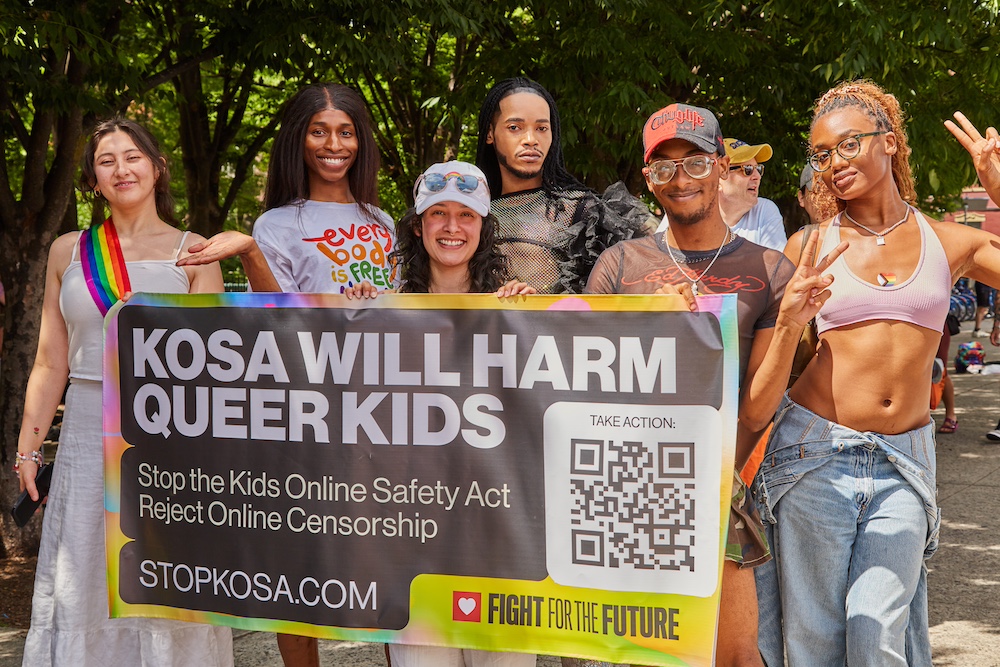

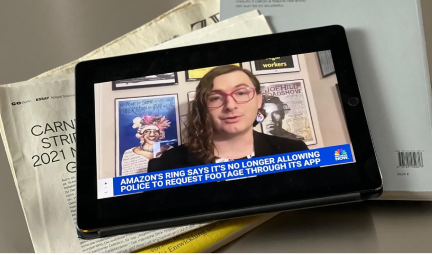

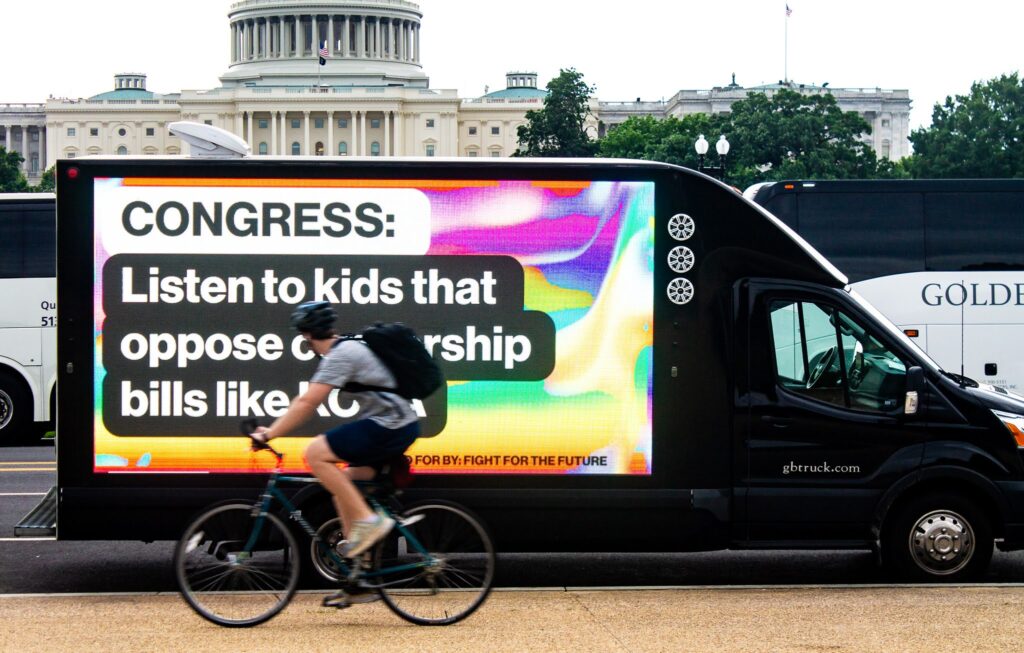


TOP SOCIAL VIDEOS